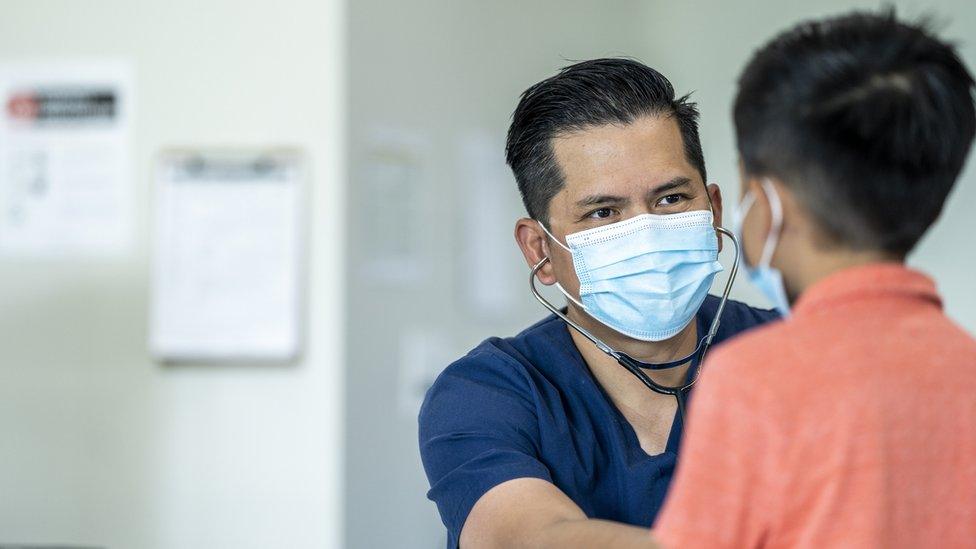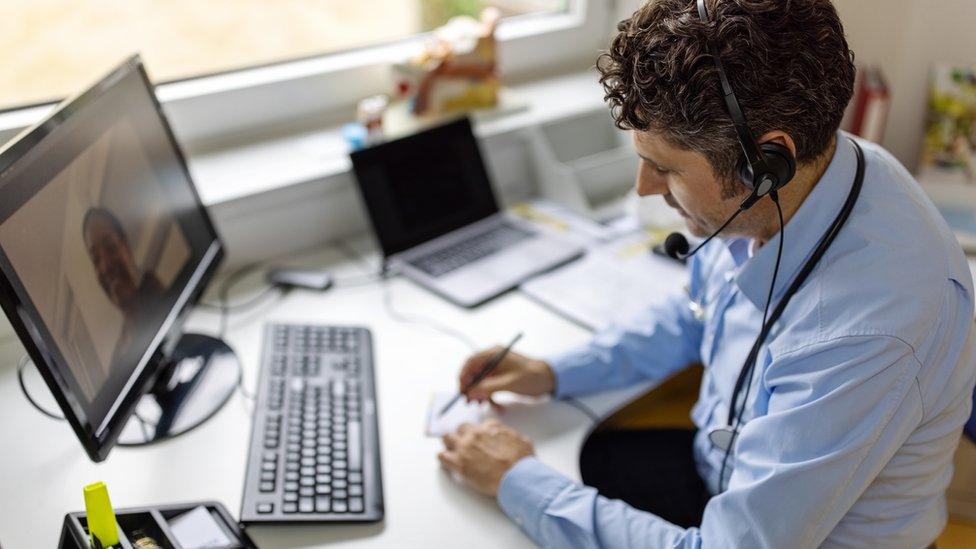GPs in Scotland warn of rush back to face-to-face appointments
- Published
- comments

GPs in Scotland are warning against a rush back to more face-to-face consultations with patients as part of the government's NHS Recovery Plan., external
First Minister Nicola Sturgeon has said the move will be one of the "key actions" for the next five years to reduce backlogs in healthcare.
The number of GPs will also be increased by 800 to try and tackle recruitment and retention problems.
However, GPs insist the hybrid system for appointments should stay for now.
The Royal College of GPs in Scotland said it welcomed the government's recognition that general practice "is going to be one of the ways out of this pandemic".
The industry body also backed the announcement of increased investment to help in-person consultations eventually return to pre-Covid levels.
But it said a major shift back to face-to-face appointments should only be made when it is safe to do so.
'Served us well'
David Shackles, joint chair of the Royal College of GPs in Scotland, told the BBC's Good Morning Scotland programme that face-to-face consulting remained "something that GPs and patients value".
He said: "It was only when we had the pandemic that there was this increased need for remote consulting.
"The model has served us very well throughout the pandemic.
"General practice is still open for face-to-face consultations when clinically necessary, and we see the likelihood of increasing face-to-face consultations as it becomes safe to do that. But we have got to make sure it is safe."

Thousands of patients have had video call consultations with their GP since the start of the pandemic
Dr Shackles pointed to the continued rise in Covid cases - with positives tests hitting a record high of 5,021 on Wednesday - as the main reason to be cautious.
He said "With case numbers and hospitalisations rising, we've got to make sure that our vulnerable patients who do attend the surgery are not at risk of Covid because we are increasing the footfall too much."
Nicola Sturgeon has insisted that, overall, the recovery plan will both reform the NHS and increase its capacity.
Its key actions will include:
Raising primary care investment by 25%, supporting GPs, community pharmacists, dentists and optometrists
£8m to support the mental health and wellbeing of the health and care workforce
1,000 more mental health link workers in communities and 800 more GPs
and £130m to deliver a National Cancer Plan and Detect Cancer Early Programme
Opposition parties have described it as "thin and flimsy". The Conservatives said it contained "a litany of recycled pledges and oversights", while Scottish Labour said it was "as underwhelming as it was overdue".
However, Health Secretary Humza Yousaf said it set out a series of benefits for under-pressure healthcare workers.
He told Good Morning Scotland: "They are right to raise concerns because staff, of course, have had the most difficult 18 months possible.
"They are, quite frankly, knackered.
"So that is why we are going to invest first and foremost in their mental health and wellbeing to make sure that what we are asking them to do, they are able to do without feeling undue pressure."
Mr Yousaf added: "We are also increasing the number of medical graduates that we are going to take by 100 per annum.
"But we will also have to look at, and the BMA and the Royal College of GPs have made this point to me quite strongly, how we retain staff in the professions that they are currently in."
'Stress on surgeries'
The Scottish Conservatives' health spokesman Craig Hoy said he feared the recovery plan would be "too little, too late".
He said: "We should be acutely aware that the Scottish NHS had a capacity problem before we went into the Covid pandemic, and that problem has undoubtedly got much worse as a result."
Mr Hoy said the 28-page document was "very thin on content, and in many senses rows back on previous commitments".
He added: "We would have wanted, for example, to see a real commitment to establishing Long Covid clinics.
"Clearly, that [Long Covid] is going to put stress on GPs' surgeries and this would also stop many patients presenting themselves at A&E clinics.
"There is also very little reference has to how A&E clinics are going to receive additional funding."

